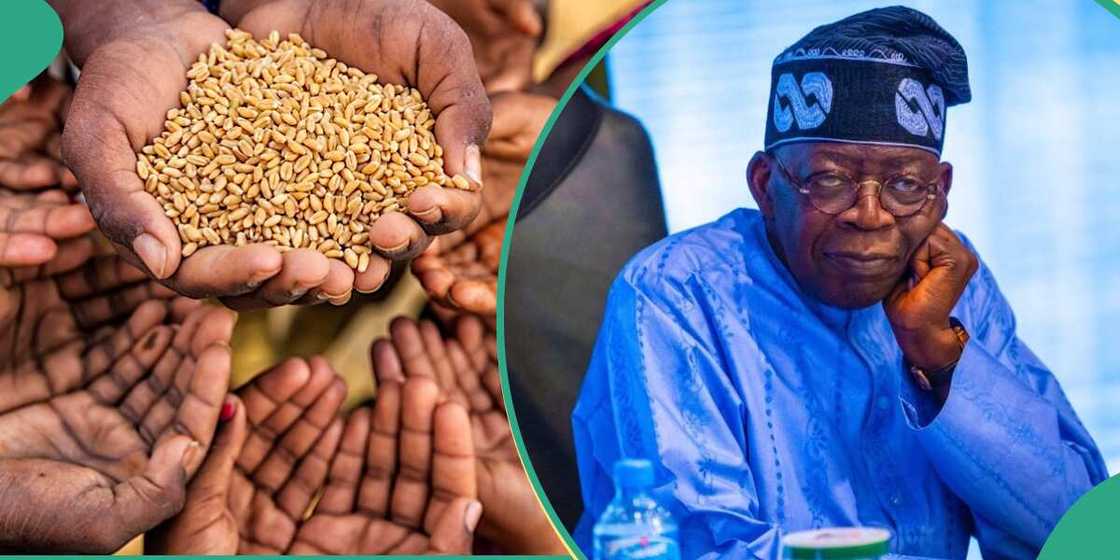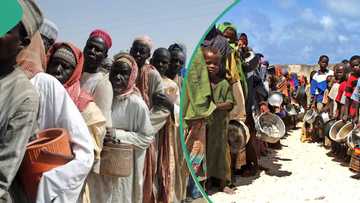Nigeria's Position Worsens in Global Hunger Index 2023 Report, Drops 6 Places
- Nigeria has descended six places amongst the entire 125 countries ranked in the 2023 Global Hunger Index (GHI)
- The 2023 ranking marks a decline in the hunger level in the country compared to its 2022 GHI ranking of 103 out of 121 countries
- The drop in ranking marks a prevalent challenge that the country is undergoing as regards food inflation and insecurity
Legit.ng journalist Victor Enengedi has over a decade's experience covering Energy, MSMEs, Technology and the stock market.
Nigeria has ranked as one of the nations grappling with a high incidence of hunger globally, as indicated by the 2023 Global Hunger Index report released on its official website.
The country holds the 109th position among 125 countries that possess adequate data for computing the 2023 GHI scores.
With a notable score of 28.3 in the 2023 Global Hunger Index, Nigeria is experiencing a significant hunger level.

Source: UGC
PAY ATTENTION: Сheck out news that is picked exactly for YOU ➡️ find the “Recommended for you” block on the home page and enjoy!
Serious hunger alert
The 2023 ranking reflects a deterioration in the hunger situation compared to its 2022 GHI ranking, where Nigeria stood at 103rd out of 121 countries.
As outlined in the 2023 Global Hunger Index (GHI) report, Nigeria holds the 109th position, narrowly surpassing India at 111th and Zambia at 110th.
Notably, Nigeria is situated below Congo and Zimbabwe, both securing the 107th rank in the global hunger assessment.
Global Hunger Index ranking metrics
The Global Hunger Index (GHI) is a comprehensive instrument for assessing and monitoring hunger on a global, regional, and national scale.
It utilizes four key indicators—undernourishment, child stunting, child wasting, and child mortality—to compute scores for individual countries.
- Undernourishment: the share of the population whose caloric intake is insufficient.
- Child stunting: the share of children under the age of five who have low height for their age, reflecting chronic undernutrition.
- Child wasting: the share of children under the age of five who have low weight for their height, reflecting acute undernutrition.
- Child Mortality: the share of children who die before their fifth birthday, reflecting in part the fatal mix of inadequate nutrition and unhealthy environments.
Based on the values of the four indicators, a GHI score is calculated on a 100-point scale reflecting the severity of hunger, where 0 is the best possible score (no hunger) and 100 is the worst. Each country's GHI score is classified by severity, from low to extremely alarming.
Nigeria's food inflation and insecurity
Despite being the most populous nation in Africa, Nigeria is currently contending with unprecedented inflation rates and food insecurity.

Read also
Full list: World Bank predicts Borno, Kaduna, 5 others will face extreme food crisis in 2024
The Food and Agriculture Organisation (FAO) said in 2023 that about 26.5 million Nigerians may face a food crisis between June and August 2024.
As of December 2023, the country's overall inflation rate stands at 28.92%, accompanied by a food inflation rate of 33.93%.
Nigeria's food insecurity is attributed to a confluence of factors, including escalating insecurity, surging food prices, and climate change induced by heavy rainfall, leading to floods in various regions of the country.
The escalating rates of terrorism, banditry, and kidnapping have compelled farmers to abandon their fields, exacerbating the challenge.
Addressing the mounting insecurity is crucial, allowing farmers to cultivate and plant without fear.
Efforts to curb insecurity are essential for fostering an environment conducive to agricultural productivity.
Experts emphasize the necessity for agricultural reform in Nigeria, particularly at the grassroots level, as smallholder farmers cultivate a significant proportion of consumed agricultural products.
They advocate for reforms encompassing farmer sensitization, strategies to mitigate flooding, and advancements in agricultural science and technology to enhance agricultural produce's production, storage, and distribution.
Addressing the root cause of food insecurity
Speaking on Nigeria's drop in the ranking, Samuel Oyekanmi, a macroeconomist, in a chat with Legit.ng, said that Nigeria's food crisis is a multifaceted challenge with severe implications for its population.
He said:
We have arrived at the situation due to a combination of factors including conflict, climate change, and economic instability. Crop failure due to erratic weather patterns, displacement of farmers due to conflict, and economic downturn exacerbate the situation.
Urgent measures are needed to address the root causes, including investment in agriculture, conflict resolution, and climate resilience strategies. Without concerted action, the plight of millions facing hunger in Nigeria will only worsen, leading to dire consequences.
Oyekanmi stressed that food insecurity not only threatens basic nutrition but also undermines social stability and economic development.
Prices of food expected to rise further in 2024
In related news, Legit.ng reported that the persistence of escalating food prices, as observed throughout 2023, is expected to contribute to ongoing food security challenges.
This development will thereby impede the African continent's ability to attain the goal of zero hunger by 2030.
This forecast is drawn from the 2023 Crop Production Report recently published by AFEX, a prominent commodities player in Africa.
The report, unveiled over the weekend, underscores the substantial hurdles posed by food insecurity and inflation, particularly in Nigeria.
PAY ATTENTION: Unlock the best of Legit.ng on Pinterest! Subscribe now and get your daily inspiration!
Source: Legit.ng





